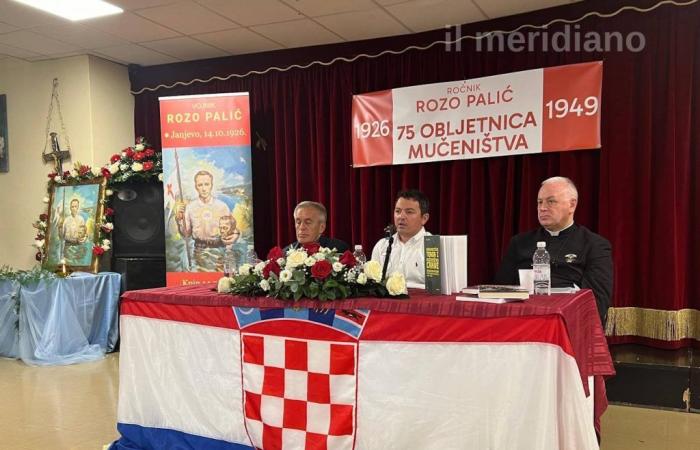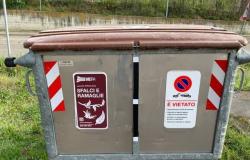
The young Croatian killed in odium fidei, Rozo Palic, was commemorated last Saturday 15 June, on the 75th anniversary of his murder on 14 June 1949 in Tenin (Knin) at the hands of the Udba. The bilingual meeting entitled “Victim of the Eucharist due to communist hatred”, conceived and organized by the young man’s nephew and spiritual heir of the same name, Fr. Rozo (Rosario) Palic, took place in the parish church of San Marco Evangelista, in the presence of a large audience from Italy, Slovenia and Croatia.
For the first time, after just under a century, the original Ozna documentation was presented to the public, all translated into Italian, which opens a window on the circumstances and methods of “neutralization and elimination” used by the secret police titina to persecute the Church and the faithful Croats. The same was also implemented against the Italians of Istria, Fiume and Dalmatia to eliminate them, force them to exodus or silence those who remained with the terror of the foibe.
The commemoration began with the concelebrated Holy Mass, led by Don Franc Pohajač, parish priest of the church of San Bartolomeo Apostolo in Trieste, in suffrage of all the innocent victims of communism. Following were the two guest conferences in Zagreb and Kistanje, which illustrated the work of Ozna and Udba against the backdrop of the dictatorship of the Yugoslav communist proletariat.
Hon. prof. dr. Josip Jurčević, historian, university professor and member of Sabor, spoke about the repression and communist crimes perpetrated during the Second World War and in the post-war period, the mapping and examination of mass graves from the war and post-war periods scattered throughout the former Yugoslavia (until today 1,751 and still being identified) and illustrated the ways of acting of the military and civil secret services of Tito’s communist apparatus, responsible for the crimes committed against around a million victims, including the Italians of Eastern Adriatic, but also FVG and Trieste. In fact, on 12 June last in Trieste the exit of Tito’s troops from the city was commemorated, after 40 days of terror.
The mayor of the Municipality of Kistanje (located in central Dalmatia, near Šibenik and Knin), Roko Antić He then illustrated the historical and social circumstances of the life of the Croatians of Janjevo during the 20th century.
The day ended with the presentation of the monograph “Victim of the Eucharist due to the hatred of communism. The soldier Rozo Palić (Janjevo 1926 – Knin 1949)” by his nephew Fr. Rozo (Rosario) Palic, priest of the Diocese of Trieste, parish priest of San Marco evangelist and spiritual assistant of the Croatians residing in Trieste and FVG, and with the inauguration of the exhibition “In the red fire like a baked bread as a gift to the world”. The volume, full of details on the troubled history of the country and its illustrious figures, defenders of the language and national identity, who resisted the centuries-old threat of extinction by the Turks, Albanians and Serbs, and the exhaustive documentary exhibition introduce the I publish this singular unknown character, coming from the small Croatian enclave, but symbol of universal humanity, courage and extreme sacrifice for the greatest ideals such as Faith, Family and Homeland.
The exhibition is open to visitors every day from 10.30am – 12.30pm and 7.30pm – 9.00pm until 14 July with the possibility of a guided tour, by appointment.
Darija Garbin
The young Croatian killed in odium fidei, Rozo Palic, was commemorated last Saturday 15 June, on the 75th anniversary of his murder on 14 June 1949 in Tenin (Knin) at the hands of the Udba. The bilingual meeting entitled “Victim of the Eucharist due to communist hatred”, conceived and organized by the young man’s nephew and spiritual heir of the same name, Fr. Rozo (Rosario) Palic, took place in the parish church of San Marco Evangelista, in the presence of a large audience from Italy, Slovenia and Croatia.
For the first time, after just under a century, the original Ozna documentation was presented to the public, all translated into Italian, which opens a window on the circumstances and methods of “neutralization and elimination” used by the secret police titina to persecute the Church and the faithful Croats. The same was also implemented against the Italians of Istria, Fiume and Dalmatia to eliminate them, force them to exodus or silence those who remained with the terror of the foibe.
The commemoration began with the concelebrated Holy Mass, led by Don Franc Pohajač, parish priest of the church of San Bartolomeo Apostolo in Trieste, in suffrage of all the innocent victims of communism. Following were the two guest conferences in Zagreb and Kistanje, which illustrated the work of Ozna and Udba against the backdrop of the dictatorship of the Yugoslav communist proletariat.
Hon. prof. dr. Josip Jurčević, historian, university professor and member of Sabor, spoke about the repression and communist crimes perpetrated during the Second World War and in the post-war period, the mapping and examination of mass graves from the war and post-war periods scattered throughout the former Yugoslavia (until today 1,751 and still being identified) and illustrated the ways of acting of the military and civil secret services of Tito’s communist apparatus, responsible for the crimes committed against around a million victims, including the Italians of Eastern Adriatic, but also FVG and Trieste. In fact, on 12 June last in Trieste the exit of Tito’s troops from the city was commemorated, after 40 days of terror.
The mayor of the Municipality of Kistanje (located in central Dalmatia, near Šibenik and Knin), Roko Antić He then illustrated the historical and social circumstances of the life of the Croatians of Janjevo during the 20th century.
The day ended with the presentation of the monograph “Victim of the Eucharist due to the hatred of communism. The soldier Rozo Palić (Janjevo 1926 – Knin 1949)” by his nephew Fr. Rozo (Rosario) Palic, priest of the Diocese of Trieste, parish priest of San Marco evangelist and spiritual assistant of the Croatians residing in Trieste and FVG, and with the inauguration of the exhibition “In the red fire like a baked bread as a gift to the world”. The volume, full of details on the troubled history of the country and its illustrious figures, defenders of the language and national identity, who resisted the centuries-old threat of extinction by the Turks, Albanians and Serbs, and the exhaustive documentary exhibition introduce the I publish this singular unknown character, coming from the small Croatian enclave, but symbol of universal humanity, courage and extreme sacrifice for the greatest ideals such as Faith, Family and Homeland.
The exhibition is open to visitors every day from 10.30am – 12.30pm and 7.30pm – 9.00pm until 14 July with the possibility of a guided tour, by appointment.
Darija Garbin



